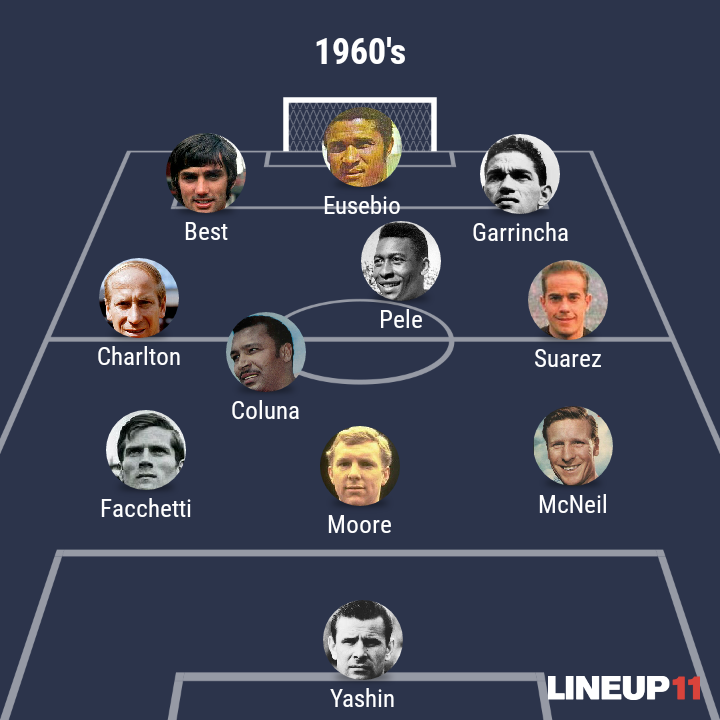The decade prior to the superlative “Total Football” artistry of Ajax and the Netherlands, oversaw the sheer wizadry of Mane Garrincha, as well as England’s first and only FIFA World Cup triumph. Showcasing a collection of the beautiful games’s most prestigious talents, the “swigning 60’s” also delivered an array of football’s most memorable encounters; ranging from the “Battle of Santiago” of 1962, to Manchester United’s thrashing of Benfica in 1968. In this article, Ryan Quinn, editor of The Conventional Playmaker has anaylsed and configured the greatest team of the 1960’s.
Goalkeeper: Lev Yashin
Arguably Yugoslavia’s greatest ever player, Lev Yashin was a vital component in the Soviet Union’s crowning footballing triumph; the 1960 European Championships. A one-club player, starring for Dynamo Moscow throughout his 20 year career, the “Black Panther” was perhaps an early prototype of Peter Schmeichel, revolutionising the goalkeeper position, being one of the very, if not the first to command and instruct his back line.
Lev Yashin efforts secured him the Ballon D’or in 1963. No goalkeeper has won the respective award since.
Defender: Billy McNeill
The Celtic enforcer was a supreme presence in the heart of defence. A strong tackler, McNeill was the Bhoy’s captain during their unforgettable 2-1 victory over Internazionale during the 1967 European Cup final. Theleader of the fantastic “Lisbon Lions”, McNeill contrasted the flamboyance and showmanship of Jimmy Johnstone, culminating in a great sense balance within the side.
Defender: Bobby Moore
Considered by none other than Pele to be the greatest ever defender, Bobby Moore was ever present alongside Jack Charlton in England’s heroic World Cup victory 50 years ago. The centre half was postively recognised throughout his career for his superb reading of the game, and his tackling ability, which also compensated for his lack of speed.
Also a hugely dominant figure for West Ham United, Bobby Moore was part of the Hammers side that secured victory in the 1965 Cup winners cup. Moore’s displays saw West Ham United retire the number 6 shirt, emphaisisng his significance with the club.
Defender: Giacinto Facchettii
Beginning his career as a centre-forward, Giacinto Facchetti eventually shone through with Internazionale as a right footed left-back. A superb combination of pace, defensive continuity and the ability to go forward, Facchetti was a consistent feature in the blue half of Milan for many years.
During his admirable time with Inter, Facchetti enjoyed consecutive European Cup successes in 1963 and 1964, defeating Real Madrid and SL Benfica respectively. International success however was always deflected at the last hurdle, a prime example being the extraordinary 1970 World Cup final, which ended 4-1 to Brazil.
Midfielder: Luis Suarez
No, not FC Barcelona’s renowned Striker who scores week in week out in Spain’s premier division. We are in fact referring to FC Barcelona’s previous player of the same name; a cultured midfielder with exceptional vision.
Having excelled with the Catalan giants through the late 1950’s, Suarez was awarded the Ballon D’or in 1960, before his move to Internazionale in the following year. Nicknamed the “architect” for his technical, orchestrating style, Suarez starred in a playmaker role alongside the like of Giacinto Facchetti and Sandro Mazzola in the brilliant Internazionale side of the 1960’s. During his time with Internazionale, Suarez won three league titles and two European Cup, as well as being nominated for a further two Ballon D’or awards.
Midfielder: Mario Coluna
Every excellent football team needs a hardworking midfielder, and Portugal great Mario Coluna certainly fits the bill. Recognised for his time in SL Benfica’s most successful period, Coluna could play anywhere in the heart of midfield, possessing energy, guile, and an a eye for both a pass and goal. Coluna also featured for Portugal during the 1966 World Cup, reaching the Semi-Finals.
Midfielder: Bobby Charlton
A component of the impeccable “Busby Babes”, Bobby Charlton, alongside manager Sir Matt Busby reformed the awfully broken team to reconquer English football, and eventually Europe.
Versatility, vision, energy, skill and a fearsome shot were all qualities demonstrated by Charlton. Manchester United’s record goalscorer was awarded the Golden Ball for his performances during the 1966 World Cup. An excellent long-range effort versus Portugal in the Semi-Final, as well as marking German starlet Franz Beckanbauer exemplified Charlton’s quality.
Attacking Midfielder: Pele
The greatest to have played football? Pele enjoyed success with Santos throughout the 1960’s. In company with Pepe and Carlos Alberto Torres, Pele guided Santos to the first ever quadruple in 1962, playing football in such a revolutionary way, with plausible brilliance.
A player who immersed skill of the most preeminent level, Pele scored goals, more or less for fun and in 1969, scored his 1000th goal.
Right-Winger: Garrincha
The “joy of the people”, Garrincha’s career highlight came in the 1962 World Cup, when without Pele, Garrincha almost self-handedly carried Brazil to glory. Garinncha followed this with a spell binding performance against Flamengo in the Rio State Championship final.
A supreme entertainer, Garrincha combined sublime trickery, with a sense of innocence that captivated the imaginations of many.
Left-Winger: George Best
The “fifth Beatle” tore defences with ease, possessing balance, raw skill and imagination which was unparalleled at the time. Considered by many to be Britain’s mightiest football product, Best played a vital part in Manchester United’s European Cup victory of 1968, tactically, the Benfica defence was unstbale, with Best drawing unecessary fouls consistently.
The only aspect of success evading Best was the opportunity to play in the World Cup. If Best had appeared, what would have happened?
Centre-forward: Eusebio
The Mozambique-born Striker was at the forefront of the greatest period in Portuguese football, winning the European Cup with Benfica, then scoring 9 goals as Portugal reached the Semi-Finals of the World Cup.
Just like Lev Yashin, Eusebio was nicknamed the “Black Panther”, and justified the title with 473 goals for Benfica, a club record. Eusebio also showcased sportsmanship; following a shot saved by Alex Stepney versus Manchester United, the Striker congratulated the goalkeeper for his act.
